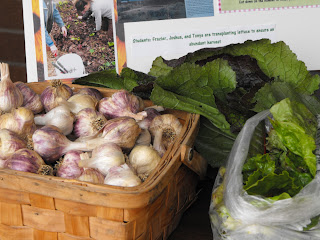 |
| Vegetables grown on LBCC's rooftop garden. By: Angulet Jones |
Sponsored by the LBCC Green Club and Sustainability Committee, the fair was coordinated by Green Club Adviser Lori Fluge-Brunker to showcase different programs that help with sustainability around campus.
Graphic arts student Jasper Hostler proudly holds up one of the posters he created to promote awareness on recycling. He worked with LB instructors Gary Westford and John Aikman on this project, putting together several variations of his artwork to appeal to different demographics. Five different designs, all with one great message to “join the sustainability revolution.”
The Sustainability Committee and Green Club started fundraising for compost and recycling receptacles in the fall of last year, and have already been able to purchase six receptacles around campus, with two more coming soon. They plan to expand to the Benton Center and Lebanon campus next. The receptacles are color coded and will be the same at every campus to get people more familiar with the idea of recycling and composting.
Have you ever
noticed how fresh the produce is in the cafeteria and the salad bar? All of the
greens used by the culinary arts are actually grown organically right here on campus
by the Horticulture Club. For this event
they gave tours of the Green Roof and the organic farm and garden, as well as
offering a farmers market where they sold garlic and bags full of mixed greens
that contained rainbow chard, chervil, arugula, and three varieties of lettuce,
all picked from the campus garden that morning.
The Horticulture
Club President, Liz Shinn, spoke about a hot trend right now called "community
supported agriculture," a food subscription program with local farmers for
people interested in fresh, local, sustainably grown produce. “Linn-Benton and
the Hort. Club are hoping to start a student CSA program here on campus where
we would grow the food and open it up to students, staff, and faculty,” says
Shinn.
For anyone
interested in upcoming events, things going on in the community, or finding out
about volunteering, club meetings are held at the greenhouse from 12-1 on
Tuesdays.
Tom Ten
Pas represented the City of Albany, and provided information on the Talking
Water Gardens, an engineered wetland used to cool the water before it goes back
into the Willamette.
"In 2006
the Oregon Department of Environmental Quality mandated new limits on the total
maximum daily loads that public and private entities can place into the Willamette
River, intended to lower river temperature and remove additional pollutants
before the treated water is safely returned to rivers and streams.” says Ten Pas, manager of the project.
Instead of
using cooling towers, the Cities of Albany and Millersburg teamed up to create
a wetland which would not only take out harmful nutrients that aren’t good to
go back into the river but would also add two to three miles of trails for people
to enjoy.
 |
Mechatronics Instructor Denis Green
demonstrated a solar water heating system, use of solar panels, and efficiency
of compact fluorescent bulbs versus incandescent light bulbs. He is teaching a brand new class this year
called “Energy Efficiency and Sustainability.”
There
are many things you can do to be more energy efficient, says Green. “Is your house insulated? Turn off your dang
lights! Get a digital tire gauge for your car. Check your tire pressures. Turn
down the hot water heater temperature. Pull the blinds at night. There’s so
much to be gained. Twenty to thirty percent of our savings could come just from
straight efficiency.”
The Green
Team of Albany First United Methodist Church handed out a new directory this
year titled “What should I do with it?” which lists several locations in Albany
and Corvallis to take “worn-out stuff” that cannot be reused or recycled. They
also distributed their “Reuse Directory,” which was launched last year to
promote the reuse of items in an effort to reduce solid waste and save landfill
space. Both directories can be
downloaded at www.albanymethodist.org.
Bryan
Schiedler, second year instructor of the automotive program, explained
methanol fuel cell technology, and the impact natural gas and electric cars
could have on our country. “We talk
about wanting better jobs and better pay and better benefits. I really think
that when we start moving over to something that we can invest in the United
States instead of a foreign country, you’re going to see that start to happen.”
Karen Kos helped to sign up students and visitors for Pacific Power’s
Blue Sky program at her booth. Opting to sign up for this voluntary
program is one way people have of “making every day Earth day” says Kos.
By choosing to go with Blue Sky, you are choosing to do business with
the wind farms through your utility, using renewable energy generated in
our region. Visit www.pacificpower.net/bluesky for more information.
Everyone involved in this event worked hard to bring awareness to all who attended. Like student Jasper Hostler said in each of his posters, “There
are thousands of us on this campus. If we all make the choice to recycle, it will make a difference.”
Students interested in helping the cause can purchase the
black and green LBCC sweatshirts, t-shirts, water bottles, and lanyards at the
bookstore. All profits go right back into the campus.
Campus Contacts: (At A Glance)
LBCC Green Club Adviser: Lori Fluge-Brunker, flugebl@linnbenton.edu
Sustainability Committee: sustainability@linnbenton.edu
Campus Contacts: (At A Glance)
LBCC Green Club Adviser: Lori Fluge-Brunker, flugebl@linnbenton.edu
Sustainability Committee: sustainability@linnbenton.edu
The Horticulture
Club: Advisor Stefan Seiter, seiters@linnbenton.edu
Mechatronics Instructor Denis Green: greend@linnbenton.com
Bryan
Schiedler, Automotive Instructor: Bryan.Schiedler@linnbenton.edu
No comments:
Post a Comment